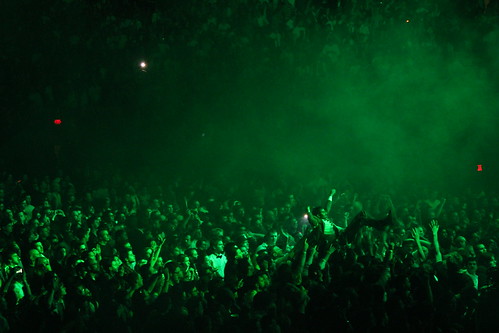from the pages of Rolling Stone....
Anthrax Open Up About First New Album in Eight Years

Mick Hutson/Redferns/Getty Images
By Greg Prato
It's hard to believe that Anthrax's last studio album,
We've Come for You All, arrived in 2003 – and that it's been 21 years since their last true studio album with singer Joey Belladonna (1990's
Persistence of Time). But with Belladonna back on board, the group's delayed
Worship Music album – which was fully recorded with a different singer, before being shelved and redone with Belladonna – should finally see release this fall.
Meanwhile, Anthrax has continued to tour, playing mammoth European shows last year with fellow thrash metallists Metallica, Megadeth and Slayer. And on Saturday, the U.S. will get its first-ever "Big 4" show, at the Empire Polo Grounds in Indio, California (the same location as last weekend's Coachella Festival).
In an interview with
Rolling Stone, drummer Charlie Benante discussed paying tribute to Judas Priest, helping Metallica early on and creating "rap metal."
Let's talk about the upcoming album, Worship Music.
When we continued working on this record again with Joey, the first song he sang when we all heard it, we all got goose bumps. It sounded like Anthrax again – it was that "sound" again.
How much of the music of the unreleased version of Worship Music is being used on this version?
Musically, a lot of the songs are the same, because a lot of the music was written prior to that. And then Scott [Ian, Anthrax's guitarist] changed a lot of the lyrics now. I rewrote three or four songs, and just finished doing the last drum track to the last song like about a week ago. We went back in and rerecorded some of those songs, too. Because I play them now with a different energy, there's a different vibe to the songs. I just felt like I wanted to go in and with this new energy, bring it to the record.
Will Joey remain Anthrax's singer from here on out?
100 percent. This is the band.
How would you describe the early days of thrash metal?
Before that whole movement happened, metal was just your traditional metal. There were little tiny sparks of things in parts of the world, but it wasn't a movement that happened with the four bands from America. If you look back at those four bands, there are elements of other bands that were doing it prior to us. When I think of the Big 4, the bands that influenced us, I always have to give respect to the Iron Maidens, the Scorpions, the Motörheads, the Judas Priests – these are the bands that helped shape what we came to do. Up until that point, metal had a certain look and a certain style. We came out, and it was just a different take on it.
As that whole thrash thing progressed, those four bands totally had their own identity. As the Eighties went on, we were just having such a good time with it all. We didn't take it so serious as maybe other bands did. And then we started to explore different territories of music. In some ways, that hurt us, because we didn't stay traditional. We probably lost some of our audience because of that at the time.
For better or for worse, did Anthrax create "rap metal"?
I think the thing we did with Public Enemy [a remake of "Bring the Noise"] was the real catalyst for it. You could say Aerosmith and Run-DMC brought it to a more mainstream audience [with "Walk This Way"]. But nothing really happened after that. And we didn't do "I'm the Man" because of that, we were way into rap before that. Here's a bit of trivia – originally, the Beastie Boys were going to do the rap on "I'm the Man." We had conflicting schedules and couldn't get it together, and then we just ended up doing it. If I had to say, Public Enemy and Anthrax took it to more of that "street vibe." Made it cool for white kids to explore or open their mind to that kind of music – which they wouldn't have.














 .
.




